Inept handling
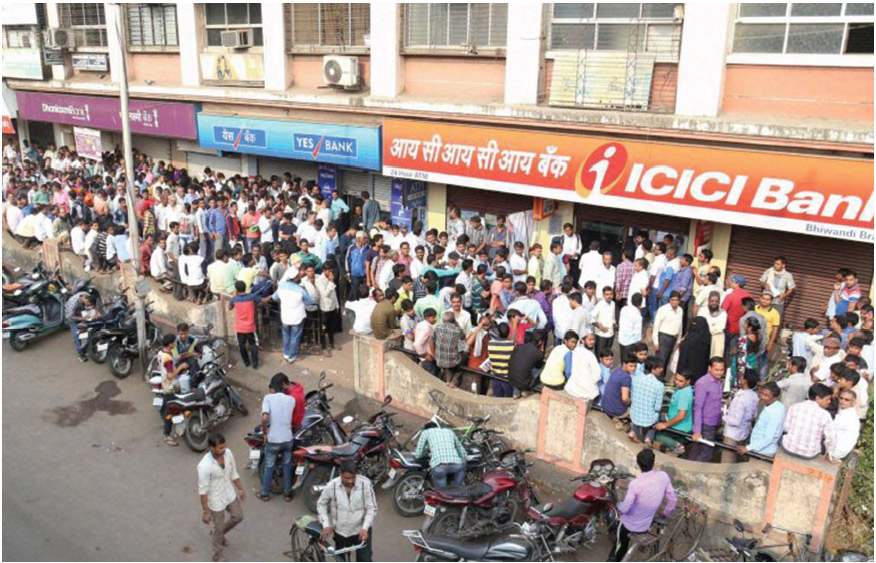
 By the time this issue
of the Power
Politics comes out,
the 50-days
'forbearance time'
that Prime Minister Narendra Modi had sought to
restore normalcy in banking
would be over.
By the time this issue
of the Power
Politics comes out,
the 50-days
'forbearance time'
that Prime Minister Narendra Modi had sought to
restore normalcy in banking
would be over.
Going by the increasing
difficulties, the ordinary persons
face at the banks and sales
points as a result of the
demonetisation of the old ₹ 500
and ₹ 1000 notes, it looks like the
problems being faced would
linger on into the next financial
year.
This is quiet contrary to Prime
Minister Narendra Modi's initial
assurance that "the a degree of inconvenience; but
this short-term pain will pave
way for long-term gains."
Finance Minister Arun Jaitley had
said the recalibration of ATM
machines for the new notes
dispensation would take only a
month. But that did not happen.
Now he says the currency
shortage would be over in 2-3
weeks (that is, by Janaury 1st
week).
Despite the difficulties,
majority of the people standing initiative as a "mahayagna" "against corruption, black
money, fake notes and terrorism" that would give the
citizens "the India of your dreams".
People also agreed with the prime minister that "It
has been a matter of concern for all of us that
corruption and black money tend to be accepted as
part of life. This type of thinking has afflicted our
politics, our administration and our society like an
infestation of termites. None of our public institutions
is free from these termites".
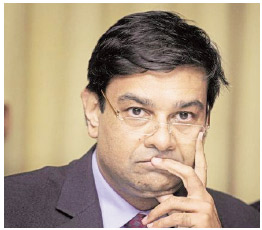 Urjit Patel
The reality on the ground today is that there is no
sign of tapering of the long queues at banks and cash
machines. Bank branches after serving about a
hundred customers a
day often report that
they have run out of
cash for the day. The
situation in rural and
far flung areas is even
worse. It is obvious
that the ordinary
citizens are facing lot
of difficulties because
of the inept handling
of the
d emo n e t i s a t i o n
management.
Urjit Patel
The reality on the ground today is that there is no
sign of tapering of the long queues at banks and cash
machines. Bank branches after serving about a
hundred customers a
day often report that
they have run out of
cash for the day. The
situation in rural and
far flung areas is even
worse. It is obvious
that the ordinary
citizens are facing lot
of difficulties because
of the inept handling
of the
d emo n e t i s a t i o n
management.
It also belies the central bank governor Urjit Patel's
claim that the preparations for the demonetisation
and printing of new currency notes had been initiated
six months before the note ban. But the arrival of the
new notes at the banking points has faulted severely
and people are suffering.
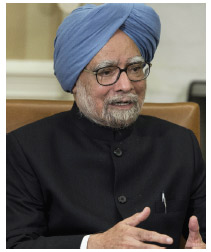 Manmohan Singh
Both the Opposition and economy monitors have
pointed out that inept
handling of the
monetisation and
continuing cash crunch
would adversely affect
growth in all sectors of the
economy. The Reserve Bank
itself downgraded the GDP
growth prospects for the
year by 0.5 per cent. Former
Prime minister Manmohan
Singh estimates it to go
down by two per cent note, said that India's GDP
growth rate would likely fall to 6.5 per cent in the third
quarter and stay subdued at 7 per cent in the
subsequent three months with the cash shortage
expected to continue.
Manmohan Singh
Both the Opposition and economy monitors have
pointed out that inept
handling of the
monetisation and
continuing cash crunch
would adversely affect
growth in all sectors of the
economy. The Reserve Bank
itself downgraded the GDP
growth prospects for the
year by 0.5 per cent. Former
Prime minister Manmohan
Singh estimates it to go
down by two per cent note, said that India's GDP
growth rate would likely fall to 6.5 per cent in the third
quarter and stay subdued at 7 per cent in the
subsequent three months with the cash shortage
expected to continue.
Reports are emanating from different parts of the
country of huge catches of stashes of the new
currency notes from influential people with political
clout, pointing to the collusion of bank officials. Many
such officials belonging to some private banks have
been taken into custody.
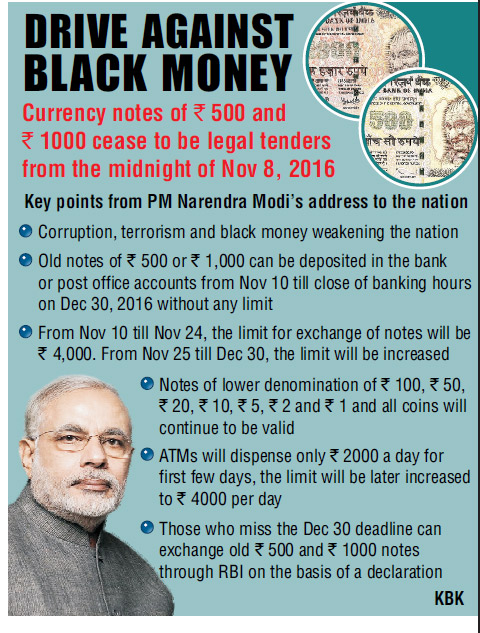
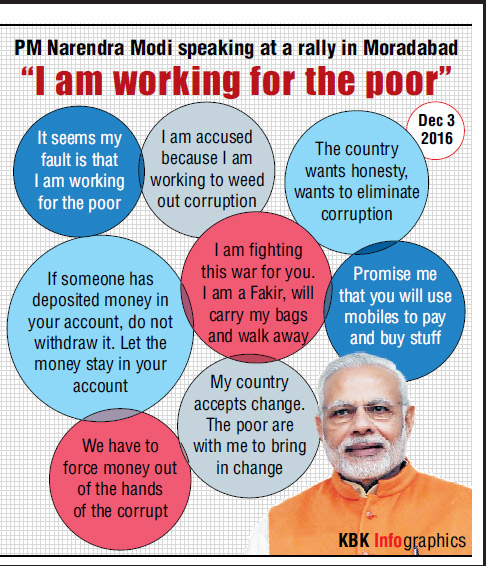
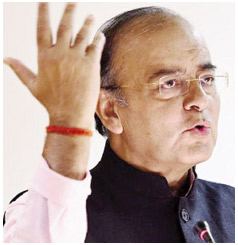 Arun Jaitley
The government itself is often changing the
narratives on the note ban and management of its
after effects. It has made several changes to the
norms which were first announced on November 8. It
points to the government's indecisiveness and gives
the impression that the
d e m o n e t i s a t i o n
decision had been
taken with inept
planning.
Arun Jaitley
The government itself is often changing the
narratives on the note ban and management of its
after effects. It has made several changes to the
norms which were first announced on November 8. It
points to the government's indecisiveness and gives
the impression that the
d e m o n e t i s a t i o n
decision had been
taken with inept
planning.
Initially, it was said
the note ban is basically
to tackle the menace of
black money. Then it
was said the objective
was to introduce
minimum currency
concept country.
Subsequently it was designated to bring in digital
transactions.
Finance Minister Jaitley said it is to help make all
future transactions substantially digital as India
moves towards a less-cash society. He also hinted at
lower direct and indirect tax rates in future as
demonetisation results in higher tax revenues from
unaccounted wealth coming into the system.
When the government initiated the 'Jan Dhan' bank
account opening scheme in the beginning, it was
stated that the objective was to bring every family into
the banking net. But critics say that the initiative
covered only half of the households in the country. If
note ban and bank payments were in the concept,
there should have been a vigorous campaign to bring
all into banking network.
Similarly, a campaign to introduce card payment at
large number of retail points should have been taken
up. It is obvious that the government faulted in
making appropriate ground work for all these stated
objectives of demonetisation.
The Supreme Court also questioned the
government for not doing enough to ease the cash
crunch in the country and warned that the situation
was getting serious that riots could break out.
After the first month of demonetisation, data point
out to the possibility that immediate gains from the
drive are unlikely to be anything significant than one
had hoped for. This is unless the government comes
out with a big number on the amount of unaccounted cash uncovered and taxed to benefit the exchequer.
The government itself allowed retaining of black money
if half of it is paid as tax.
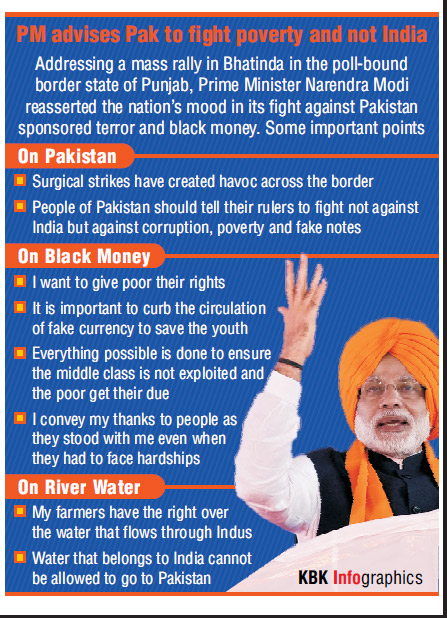
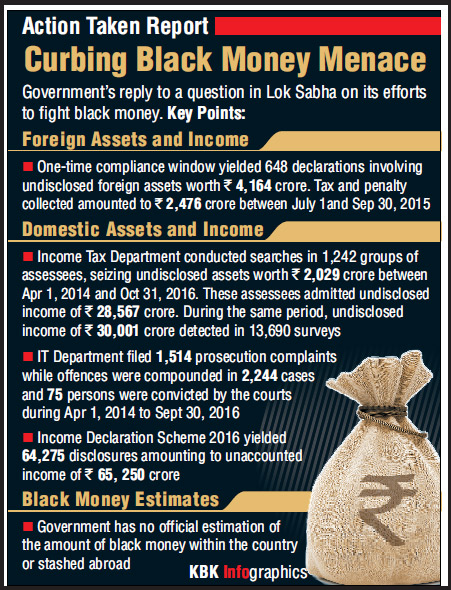
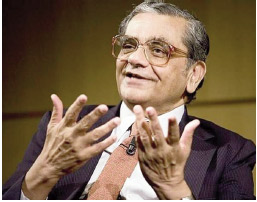 Jagdish Bhagwati
There is also a growing apprehension whether the
government would really succeed in achieving the
stated objectives of the demonetisation and targeted
currency circulation objective.
Jagdish Bhagwati
There is also a growing apprehension whether the
government would really succeed in achieving the
stated objectives of the demonetisation and targeted
currency circulation objective.
Speculations that the government will benefit from a
"windfall" gain from RBI when a significant chunk of
currency notes do not find their way back to the
system, has ended after RBI governor Urjit Patel
clarified that there is no plan to give any special
dividend to the government.
However, eminent
economist Jagdish
Bhagwati maintains
that the massive
deposits with banks
post demonetisation
may push the
government for slight
increase in
expenditures of
various social
programmes. "Around
80 per cent of the currency in higher denominations
has now been deposited back into bank accounts. Since
individual deposits will now be matched with their tax
returns and unaccounted deposits will be taxed, this
will yield a windfall for the government permitting
large increases in social expenditures," he said.
Former UIDAI Chairman Nandan Nilekani hailed the
government's demonetisation move and said that it
would see a massive activation of digitisation of
financial services in the country. He also said that
Aadhaar, UPI, USSD and micro ATMs will help India
accelerate the roll out of digital financial services.
"What would have taken another 3-6 years to get rolled
out, Because of the urgency of the matter, it will
happen in 3-6 months," Nilekani said.
However, former economic advisor to the
government and ex-World Bank chief economist
Kaushik Basu said "Demonetisation will cause the
economy to run into great difficulties in the future. He
said "Even the idea of walking towards a cashless
society is a long stretch for India. Currently, close to 98
per cent transactions take place through cash. He said
even the US would take 10-12 years to achieve such a
goal.
The worse is that the inept handling of the postdemonetisation
management has resulted in wash out
of the winter session of Parliament which, in turn,
would delay the introduction of the Goods and Services
Tax (GST).
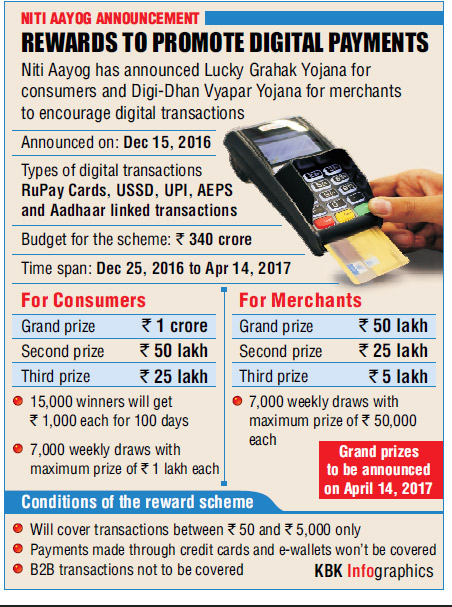
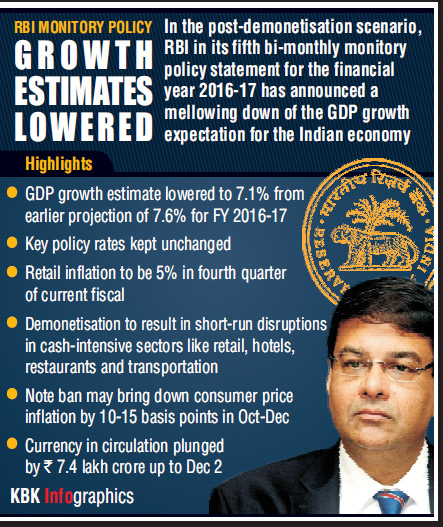






 Urjit Patel
Urjit Patel Manmohan Singh
Manmohan Singh

 Arun Jaitley
Arun Jaitley

 Jagdish Bhagwati
Jagdish Bhagwati
